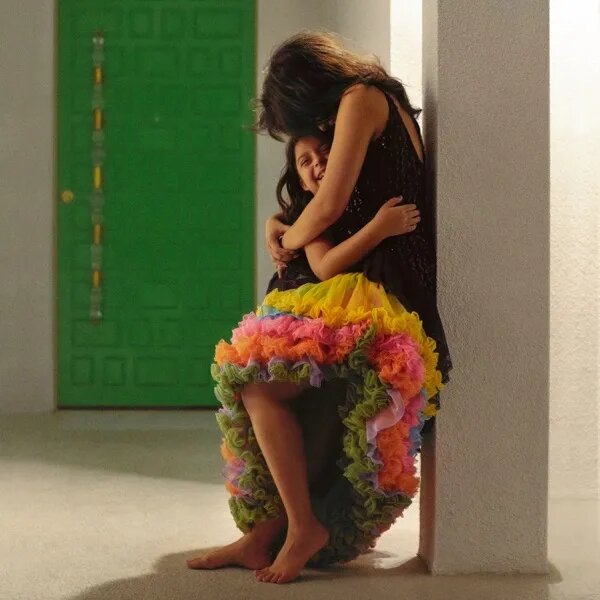Album Review: Camila Cabello, 'Familia'
Since Camila's exit from the Simon Cowell-engineered Fifth Harmony six years ago, she is still the only one of the group's five members to release a full-length album. Now on her third record, Camila finds herself in a precarious position. Commercially, she seemed to have peaked with the runaway success of her debut album's singles. Romance, her sophomore album, disguised its road bumps with on-the-pulse collaborations with DaBaby ("My Oh My") and Shawn Mendes ("Señorita"). Culturally, Camila has still remained a constant tabloid and Twittersphere figure, for better or for worse. Whether she's in the throes of controversies surrounding her anti-black Tumblr past or announcing her split from Shawn Mendes, Camila's name still moves the needle. With Familia, her third studio album, and the first post-Shawnmila LP, Camila cannot escape the pressure cooker of celebrity. Even on an album that features and is dedicated to her family, her relationship with Shawn informs the majority of the record. Her most musically rich album yet, Familia places its bets for success on its juxtaposition of lyrical post-breakup therapy against a lush exploration of Camila's musical legacy. Luckily, most of these bets pay off handsomely.
Familia features Camila's first songs of her own to be completely sung in Spanish. Some may find the choice a cheap play for the Latin market as Camila's Top 40 appeal seems to have waned in recent years, but that would be a cruel assumption. Camila's Mexican-Cuban heritage is on full display on Familia as the album fondly showcases some of the pockets of brightness that the pandemic brought her family. From the revolving door of featured artists to the scores of different lyrical topics, Familia feels as warm and as crowded as a family house party. Jaunty trumpets and enticing guitars bounce off the walls that Camila studies and deconstructs with some of her most vulnerable songwriting yet. On "Boys Don't Cry," Camila sings, "Hate it when you shut me out / Actin' like it's your shit to figure out / Don't wanna be touched, don't wanna discuss." The song's second verse is a careful examination of how toxic masculinity frays the seams of relationships by way of stifling communication between partners. It's a lot to fit into a pop song, but Camila does it brilliantly. Throughout Familia, Camila improves upon the unfocused Romance by carving out a truly unique lane for her approach to post-breakup music. Although the music is explicitly informed by her relationship with Shawn, Familia moves beyond specificity into a realm of universal lessons and experiences that are hallmarks of millennial and Gen Z romance. "Psychofreak," an unexpected collaboration with WILLOW, is another appreciated moment of vulnerability. Camila's odd punk-pop enunciation doesn't mar revelatory lyrical moments like "On my Instagram talkin' 'bout 'I'm healed' / Worryin' if I still got sex appeal." From the "Tom's Diner"-esque vocalizations in the post-chorus to the overall rumination on semi-chosen families (social media & Fifth Harmony), "Psychofreak" is one of the most delightful surprises in pop music this year.
Epic
In the past, Camila's collaborations have always felt a bit lacking, but Familia rectifies that. "Bam Bam," the album's biggest single so far, finds Ed Sheeran leaning into his Latin pop bag for an undeniable hit. Maria Becerra steals the show on the disco-inflected "Hasta Los Dientes," but it's "Lola" that earns the title of Familia's best duet. The Yotuel-assisted "Lola" is the jewel of Familia. A precious ode to those who rallied in anti-government protests in Cuba last year, "Lola" finds Camila exploring where her heart truly finds its home — with her family in any and every country. Twinkling piano underscores the album's most somber moment, and Camila's voice finally works with the production. Elsewhere on the album, like on the underwhelming lead single "Don't Go Yet," Camila's voice sounds as if it is at odds with the music behind it. Even the high-stakes melodrama of "La Buena Vida" wilts because Camila's voice is too thin to handle such robust instrumentation. It's still a remarkable offering from Familia, but one that highlights the shortcomings of Camila's vocal abilities.
At times, Familia feels like a tug-of-war. Bright spots like "Celia" and "Everyone At This Party" find Camila making some of the best songs of her career. Nevertheless, forgettable tracks like "No Doubt" and "Quiet" sound like rejects from past albums that were forced onto this album's track listing. "Quiet," in particular, disrupts the flow of the album from a sonic standpoint. If anything, Familia is Camila at her most comfortable and at ease. Easily her best album, it finally sounds like she's figured out who she is as an artist and what matters to her as a storyteller.
Key Tracks: "Psychofreak" | "La Buena Vida" | "Lola" | "Everyone At This Party"
Score: 73






